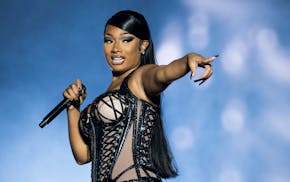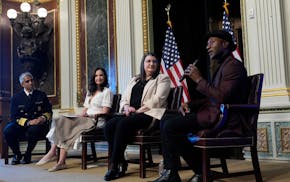Brief, moving and powerful, Max Porter's debut book "Grief Is the Thing With Feathers" is billed as a novel but is more like a play for voices or, possibly, a prose poem. It is told purely in dialogue among three characters: "Dad," who has lost his wife; "Boys," his two motherless sons, who speak with one voice, and "Crow," a trickster-savior-truth-teller (and, yes, a bird).
As the father and boys move through their memories and grief the conversations are profound, quirky, funny, hopeful, occasionally profane and sad. Critics have called the book exquisite and deeply moving; in the Star Tribune, critic Ellen Akins said the book is "tiny but potent."
"Grief" was shortlisted for the Guardian First Book Award and won the Dylan Thomas Prize, which goes to a writer under the age of 39. In this e-mail interview in advance of his visit to the Twin Cities on June 23, Porter, who lives in London and works as an editor at Granta Books, talks about his sudden fame, how the blues help him write, and what to do when someone faints at a reading.
Q: Your book has received tremendous acclaim and now, as you begin your U.S. tour, it has won the Dylan Thomas Prize. How has all of this affected you?
A: I'm fortunate to be kept very grounded by my wife and kids. It's hard to be too affected by literary success when there are nappies to change, Lego models to build, meals to cook. But I feel now I can call myself a writer, think about a future in which I write more books. And that feels good. I am thrilled people have been moved or interested by what I wrote. Humbled and thrilled.
Q: Tell me about the genesis of the book. I believe I read that your own father died when you were young.
A: He did, and I miss him, and I thought for years about how to write the story of two siblings who lose a parent. I wanted to write the sibling relationship as a character, rather than two. It's a love letter to my dad, or a gift for him. He had unfinished business on this Earth and my book is a way of making some noise for him.
Q: Are the boys part you?
A: The boys are based on my childhood, but also the childhood of my kids, and also a general love of children's extraordinary emotional versatility, wit, energy, capacity for love and change.
Q: What about the Ted Hughes-scholar dad?
A: He's the kind of guy I'd like if I met him, I think. He's probably kinder and more romantic than me. I enjoyed writing him and recognizing where he differed from me.
Q: And Crow? You, at all?
A: Yeah, a lot me. His anger at the mundane clichés we all drag around about mourning. His love of language, filthy language, lovely language, playing with words. His switchback between silliness and seriousness, darkness and light was kind of an autobiographical reckoning for me. And toilet humor, that is important!
Q: How did Ted Hughes' "Crow" influence the novel? Were there any particular poems (or poem) that figured in your thinking?
A: I wanted to imagine someone being so obsessed with a book of poetry that it comes alive, haunts them, moves in with them. And the Crow poems are perfect for that, in this story, as loaded as they are with pain and guilt and rage. I love the book, but it isn't my favorite Ted Hughes. It's ugly and radical and fascinating and important, but I'd want something calmer and more lyrical on my desert island.
Q: Your book has been praised for crossing genres (is it poetry? or essay? Or fiction? Or …?). Do you have thoughts on the homogenizing of publishing these days? Are there bright spots?
A: I'm very keen on hybridity, but not necessarily for the sake of it. I think any art has to find the truest form for what it wants to convey, how it wants to be in the world. I hope my book makes some trouble for the very damaging and counterproductive boxes we are forced to think about these days as regards literature. If my book is anything it is anti-algorithm. It seeks to muck up the smooth classifications, hop around in the bookshop having fun, causing trouble. Because trouble is good, trouble is love.
Q: Why the title? Just a nod to the Crow? Or is there something more to it, linking grief and hope?
A: It's an homage to [Emily] Dickinson, a suggestion that grief is as generative, as vast, as hope. But I'm also suggesting poetry is the reader's to own, to interpret, misinterpret, remember, misremember. I hope it sums up the loving critical energy of the whole book. That poetry can save us, can teach us things, but you have to fully let it into your life and it may cause havoc. And that may or may not have anything to do with the poet, or the poet's intention. It lives again and again every time you read. Infinite times.
Q: Describe your writing room.
A: I wish I had one. I wrote this book in what is now a baby's bedroom. I am currently setting up a desk in our bedroom. Space is tight, in a small flat with three kids and a lot of books!
Q: What is your writing strategy — do you have rituals that you maintain?
A: I listen to African blues music while I write. I move between a sketchbook and the screen so I can draw and doodle and map things out. I also send myself Gmail drafts back and forth, and the novel is built out of that conversation with myself.
Q: How do you get past writers' block (or the distraction of the internet)?
A: I'm yet to find out because this first book came pouring out. I find the internet fairly easy to ignore, but work e-mails and my lovely children are bigger distractions. He says, reaching to tweet a pun.
Q: Do you have a favorite book from childhood?
A: "Angry Arthur" by Hiawyn Oram and Satoshi Kitamura. It's still a favorite now, a book of a lifetime.
Q: What books do you re-read?
A: Icelandic sagas, fairy tales, "The Iliad," "The Odyssey," the poems of David Jones, early Anne Carson, all of Emily Dickinson. "Riddley Walker" by Russell Hoban. And I re-read a lot of kids books. For a reminder of what is fresh!
Q: What's on your desk?
A: My new desk, in the bedroom, has nothing but the computer and my notebook. But I have pinned up three postcards: a watercolor of a garden, a linocut I did of my son, and a picture of the Westbury white horse, a chalk horse on an English hill.
Q: Where are you right now? Describe what you see.
A: I'm at work, gazing at a 400-page nonfiction manuscript I have to edit this week. It's saying to me "What, are you scared??"
Q: What are you reading right now?
A: Denise Riley's poetry book "Say Something Back." A Gothic thriller called "The Loney."
Q: What's been the best place so far to do a reading?
A: I did a tiny bookshop event in East London, hardly any people, and someone fainted. I heard a tiny voice from the back saying, "Please, carry on, don't mind me!" which was very English.
Q: What authors have inspired you?
A: I hope every single author I've ever read has inspired me. Some giving me permission to write in certain ways, to do things formally and stylistically, and some to remind me what I don't like, or think is cruel or wasteful or lazy. Writers have to keep reading, widely and voraciously. I want to keep being charmed, keep being outraged. Occasionally falling in love and wondering how the hell they did that.
Laurie Hertzel • @StribBooks • facebook.com/startribunebooks

Photographer alleges he was forced to watch Megan Thee Stallion have sex and was unfairly fired
Phish fans are famously dedicated. What happens when they enter the Sphere?
Minneapolis will bid to host Sundance Film Festival

Icehouse on Eat Street in Mpls. facing eviction for unpaid rent
